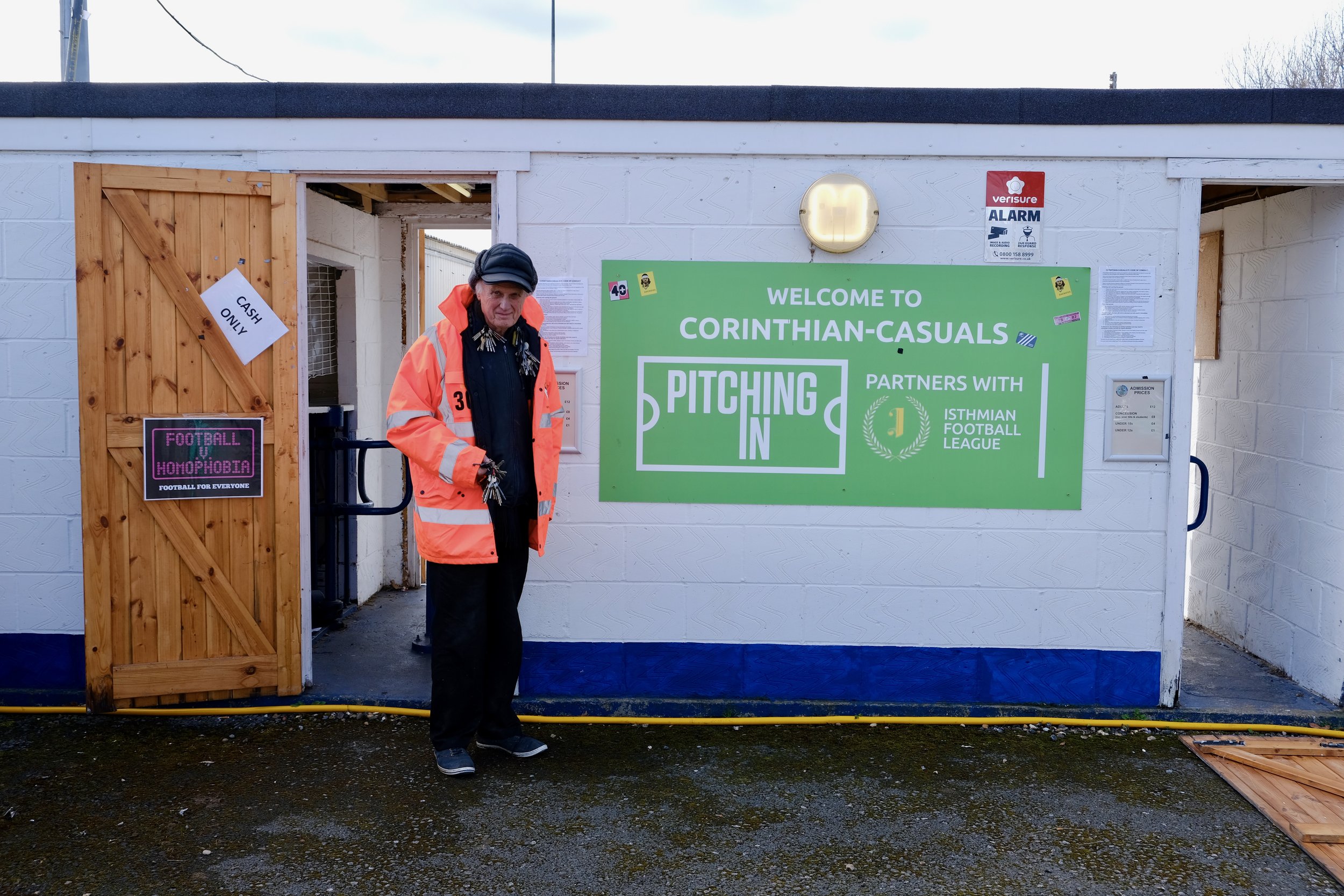Don't let it drag you down now

Words: Zac Welshman
Images: Zac Welshman
Dirty dishes from a TV meal
That went cold from the wind through a smashed up window
You can't go out if anybody calls you
'Cause you can't have a bath when there's no hot water
And your friends are out on the town again
And you ask yourself if it'll ever end
And it's all too much for your head to take
Just a matter of time before you break, well…
We’ll Live and Die in These Towns. The Enemy.
It can be difficult to pinpoint when Mark Robins, in his second spell as manager of Coventry City, changed how the people of Coventry felt about their football club.
Prior to his appointment in March 2017, the Sky Blues were on life support.
Homeless, devoid of any meaningful connection with the local community and falling wistfully toward the fourth tier of English football for the first time in almost 60 years.
In truth, there was little hope that Robins, or any manager for that matter, could genuinely turn the tide so long as the London-based hedge fund SISU retained control of the club.
Less than a month into his reign, Robins was in the dugout as Coventry returned to Wembley for the first time since their 1987 FA Cup success. But a 2-1 win over Oxford United and the Checkatrade Trophy that came with it felt more like a temporary respite than the start of any meaningful change given a myriad of off-field issues.
©Zac Welshman/ Terrace Edition. Coventry City vs Manchester United. FA Cup Semi-Final. Wembley.
In his first full season as manager Robins oversaw the club’s first top-six finish, in any division, for 48 years; earning promotion back to League One via another trip to Wembley and a playoff final victory over Exeter City.
But cynics would say, despite what anyone associated with the club will tell you given the ongoing governance concerns, that this was the expectation. Even the League One title and a return to the Championship in 2020 came with a COVID-induced asterisk that meant muted celebrations took place behind closed doors.
None of the above should disparage Robins’ early achievements at Coventry City. In fact it serves to emphasise them. The SISU years, which lasted from 2007 to 2023, were dire times for Coventry.
Robins’ successes coincided with a string of operational embarrassments that had been recurrent long before his arrival. Stadium expulsions, points deductions, legal spats and countless fan protests; regardless of what happened on the pitch, City remained unstable.
A new era of ownership under local businessman Doug King began in January 2023, further healing the divide between fan and club by offering genuine investment and transparency in its actions.
Yet without Robins successfully navigating a system that had broken many a manager before him, it is doubtful whether enough of the club would have survived for King’s takeover to have ever been viable.
©Zac Welshman/ Terrace Edition. Coventry City vs Manchester United. FA Cup Semi-Final. Wembley.
In May of last year King watched on as Robins made his third visit to Wembley in what was simultaneously one of his greatest achievements, and his most agonising “what if?”
A remarkable league campaign, littered with late goals and heart-stopping comebacks, culminated in a Championship Play-Off Final matchup against Luton Town. The ultimate prize, a return to the Premier League, was denied, ironically by a penalty shootout.
Regardless, for onlookers that season is perhaps the easiest place to draw a line in the sand and mark Coventry City’s return to stability and prominence.
But it can still be difficult to pinpoint when Mark Robins changed how the people of Coventry felt about their club. With countless golden moments spread across several years, for many fans, it was too gradual a change to put a genuine marker down on any specific part of it.
The only certainty for the 36,000 Sky Blues sprawled across Wembley Stadium’s South Stand, myself amongst them, for an FA Cup semi-final against Manchester United, was that he had.
©Zac Welshman/ Terrace Edition. Coventry City vs Manchester United. FA Cup Semi-Final. Wembley.
Perhaps the best evidence of this could be seen, or rather heard, in what has become the club’s de facto anthem. Local band The Enemy released their 2007 album We’ll Live and Die in These Towns with an honestly depreciative assessment of life in West Midlands city running right the way through it.
The album’s titular track zeroed in on this, focusing on the monotony, stagnation and anger that used to envelop both the city and the football club.
In 2024 though, that song rang around Wembley Stadium’s speaker system, as it now does before every home game at the CBS Arena, cutting out before the chorus and allowing travelling Coventrians to finish the lyrics with a booming acapella roar. It was loud and it was unmistakably proud.
There used to be a football club-sized hole in Coventry. But a resurgence in every possible sense, kickstarted by Robins and his backroom staff, has filled that void.
Kids are proud to support their local club once again, City fans have stepped away from the woodwork they used to creep behind.
Now, on matchdays, both home and away, fans and players feed off of each other creating a frenzied, ear-splitting atmosphere wherever they go.
That showed against Manchester United on 21 April. With United three goals ahead and just 20 minutes left to play, it looked like City’s FA Cup run would end with a whimper.
A forgivable whimper given the financial disparity that separates Manchester United from any club outside the Premier League’s “Big Six”, let alone a Championship one, but a whimper nonetheless.
©Zac Welshman/ Terrace Edition. Coventry City vs Manchester United. FA Cup Semi-Final. Wembley.
That was until summer signing Ellis Simms steered a Fabio Tavares cross toward goal and past Andre Onana.
For what felt like the millionth time, the never-say-die attitude that has become such a feature of Robins’ tenure began to creep across the stadium.
When Callum O’Hare, aided by a significant Arron Wan-Bissaka deflection, saw his strike loop into United’s net eight minutes later that attitude swallowed Wembley whole.
Something special was happening. Even if no one dared to say it aloud.
United have made a habit of throwing away leads this season and with an assault of indiscriminate Coventrian racket raining down onto the pitch, they folded.
It seemed inevitable that one more chance would come and in the 95th minute, when a Tavares cutback met Wan-Bissaka’s arm, it did. Haji Wright, another player in his first season at the club, stepped up to take the resulting penalty, and Wembley felt tranquil.
Calmer than it had been at any point before or during the game. Despite so much resting on that spot kick the outcome was never in doubt. Bang! Goal. 3-3. Parity restored and the latest, greatest Robins comeback complete.
VAR would deny Coventry of their crowning moment, chalking off Victor Torp’s 120th -minute winner for an offside in the build-up.
But whether it counted or not, the release of 36,000 fans consigning all those years of hurt to the past was the greatest moment I have ever experienced at a football game.
That moment of manic ecstasy flashing through the crowd was unparalleled and unstoppable.
It was the high that every football fan across the world chases week in, week out.
The penalty shootout and subsequent loss almost seemed irrelevant. No doubt I would feel differently had Coventry landed on the right side of luck and progressed to the final.
But as a sea of sky blue stayed long after the final whistle to applaud their heroes whilst United’s fans exited en masse, nothing else but local pride and local passion really mattered.
After the game, a Manchester United fan said to me that having victory snatched away like that must be one of the hardest things that any football fan could experience. In a way he was right, but I didn’t feel like that.
©Zac Welshman/ Terrace Edition. Coventry City vs Manchester United. FA Cup Semi-Final. Wembley.
Any disappointment or anger I could have felt about the result was muted by joy. We had gone toe-to-toe with the giants, on the biggest stage, and knocked them to the canvas.
Not too long ago that would have felt impossible. They may have mustered enough energy to get back up and knock us out, but it didn’t bother me.
Regardless of the result, we had won.
As a player, Mark Robins scored the goal that is said to have saved Sir Alex Ferguson’s job as Manchester United manager in 1990, inspiring an unparalleled era of success.
To many United fans, he is a cult hero. As a manager, Robins has spearheaded a seven-year-long revolution at Coventry City that lifted the club from the gutter and restored pride to a city that forgot what that could feel like.
To all Coventry fans, he is a bona fide legend and the city won’t be dragged down any longer, above us there’s only blue sky.
You can find Zac on X: @ZacRWelshman












